This week saw heavy German air raids on Liverpool, Southampton, Birmingham and Bristol. Having driven Italian forces out of Greece, the Greek armies continued to advance into Albania. On 26 November workers began the construction of a wall around the Jewish ghetto in Warsaw, and on 29 November plans for the invasion of Russia next spring by Germany, codenamed Operation Barbarossa, were finalised. Also on 1 December for the first time Italy began the rationing of pasta.
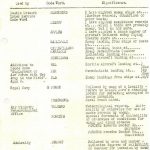
The Home Guard were now issued with a list of top secret code words to be used in emergencies. Some of them were just abbreviations – “HAL” for “Hostile Aircraft Landing”, or “PAR” for a landing by parachutists – but other were rather more imaginative: “STARLINGS”, for instance, referred to enemy aircraft, “PARASOLS” to enemy parachutists, and “MUSHROOMS” to naval beach mines. The seriousness behind the list can be seen in the code word “FORCEPS”, used to report an enemy gas attack.
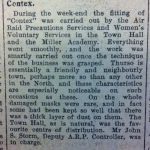
Speaking of gas, the John O’Groat Journal reported this week that people in Thurso were having their gas masks fitted with the new “Contex” filters (a conflation of “container extension”). These were shallow round tins that attached to the bottom of gas masks by adhesive tape, and were able to screen the wearer from Arsine gas, which attacked the liver and kidneys.
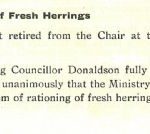 In domestic news, the mainland burghs were up in arms against the proposal to give the kippering industry of Stornoway an extra herring ration. In the past, herring landed at Ullapool went to mainland kipperers, while those at Stonoway naturally went to kipperers
In domestic news, the mainland burghs were up in arms against the proposal to give the kippering industry of Stornoway an extra herring ration. In the past, herring landed at Ullapool went to mainland kipperers, while those at Stonoway naturally went to kipperers  there. Now, it had been announced that Stornoway kipperers would also get a ration of the Ullapool herring, and the mainland traders weren’t happy.
there. Now, it had been announced that Stornoway kipperers would also get a ration of the Ullapool herring, and the mainland traders weren’t happy.
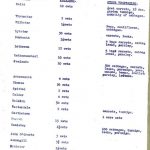 Finally this week, if you’ve ever wondered how useful the “Dig for Victory” campaign really
Finally this week, if you’ve ever wondered how useful the “Dig for Victory” campaign really 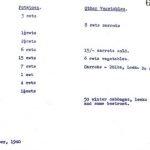 was, the Director of Education reported on the numbers of vegetables grown in schools. Halkirk, Lybster and Thurso schools produced the most hundredweights of potatoes (50, 30 and 20 respectively), while Newlands grew 300 cabbages and Canisbay 100. But every school taking part made a contribution, from Keiss with half a hundredweight of carrots, to Lanergill with “50 winter cabbages, leeks and some beetroot”.
was, the Director of Education reported on the numbers of vegetables grown in schools. Halkirk, Lybster and Thurso schools produced the most hundredweights of potatoes (50, 30 and 20 respectively), while Newlands grew 300 cabbages and Canisbay 100. But every school taking part made a contribution, from Keiss with half a hundredweight of carrots, to Lanergill with “50 winter cabbages, leeks and some beetroot”.
